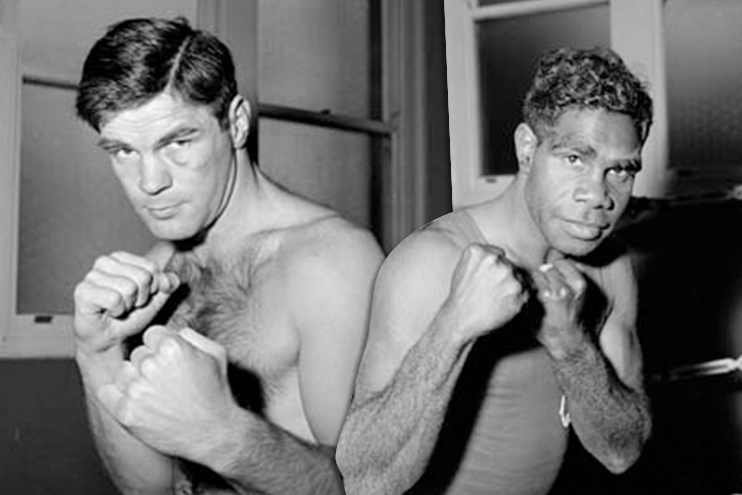
By Ian Hanson
*WARNING: Aboriginal and Torres Strait Islander readers are warned that the following article contains images of deceased persons.
Despite their different journeys to the Perth Games, boxers Tony Madigan and Jeff Dynevor remain Greater Together as Australian boxing gold medal winners.
The man who would carry the Australian flag into Perry Lakes Stadium for the Opening Ceremony for the British Empire and Commonwealth Games in Perth in 1962 had to rely on daily skipping routines to stay in shape, while onboard an ocean liner sailing from New York to Sydney.
While one of his young teammates who would march behind him had the year before cutting his finger off in a work accident in the dusty Cherbourg Aboriginal Settlement in northwest Queensland.
Teammates, but completely different in terms of background and experience and both left an indelible mark on the Commonwealth Games and Australian sport.
Tony Madigan was a decorated two-time Olympic and Commonwealth Games boxer – the country’s leading amateur fighter who had his sights set on qualifying for a record third Commonwealth Games and a slice of history.
The other, Jeff Dynevor, had spent his childhood fighting for his life and knew if he won the Australian title then a place on that same Australian boxing team awaited him.
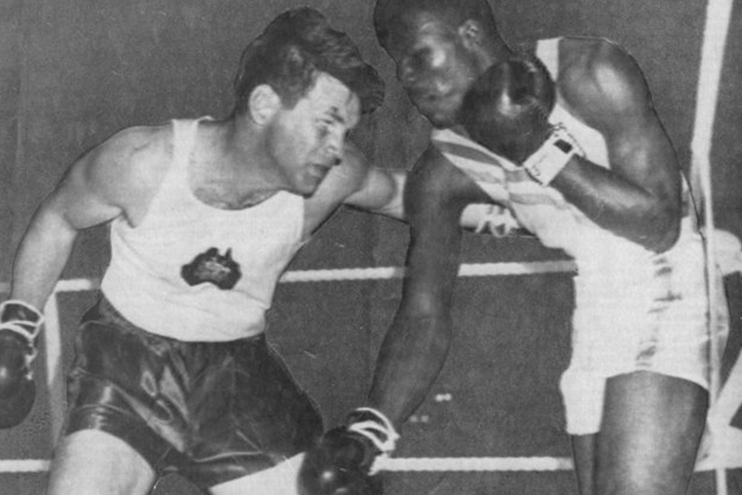
Tony Madigan boxing at the Perth 1962 Games. (CGA Archive)
Madigan was 32-years-old and a man who had toured the world boxing and playing rugby union, Dynevor was just 24, and outback Queensland was his only world.
Madigan was a light-heavyweight who had fought the great Cassius Clay (who would later become Muhammad Ali) before winning bronze in the Rome Olympics two years earlier.
Dynevor was a kid who had fought his way through the boxing tents of country Queensland, stepping and weaving his way to the top with a powerful left hand.
And along with boxing teammates Adrian Blair and Eddie Barney and high jumper Percy Hobson, they were Australia’s first Aboriginal Commonwealth Games representatives.
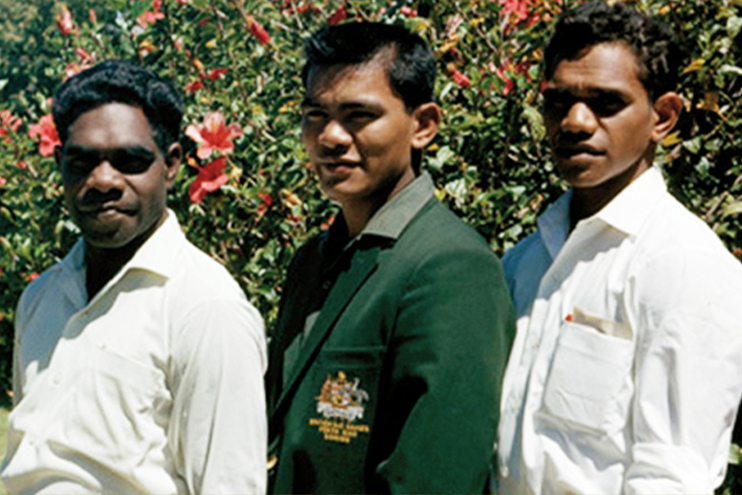
Jeff Dynevor, Adrian Blair and Eddie Barney at the Perth 1962 Games. (CGA Archive)
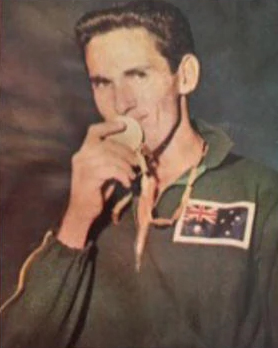
Percy Hobson with his gold medal at the Perth 1962 Games. (CGA Archive)
Both Madigan and Dynevor would be triumphant in Perth – winning Commonwealth Games gold in front of a home crowd as Australia (38 gold 26 silver and 31 bronze for a total of 105) topped the medal tally ahead of old foe England (29-22-27 for a total of 78).
For light-heavyweight, Tony Madigan, who had been in retirement and playing rugby and working in New York as a male model, he wanted to defend the gold medal he’d won in Cardiff in 1958 and become the first Australian boxer to achieve such a feat.
But it was a tall order to spend months at sea, having paid his own fare from New York, and fighting on the NSW State Championship card at the NSW Leagues Club on the same day as his arrival.
The Olympic light-heavyweight bronze medallist had to win the title and then take the Australian Championship in August if he had any hope of being selected on his third Australian team.
And he survived a nasty head gash that required five stitches and a hospital visit between the NSW semi-final and final, winning the title and then the Australian Championship.
Madigan was given the honour of being Australia’s flagbearer and would be unstoppable at the Games, with three consecutive wins in round one, the quarter-final and semi-final, two requiring the referee to stop the fight.
In the final that went the distance, he defeated Ghana’s Jogo Miles in a decision.
He had become the first athlete in history to retain his Commonwealth Games title. He made an attempt to qualify for the 1964 Tokyo Olympics, but a couple of losses led him into retirement.
Madigan is one of just six Australians to win an Olympic boxing medal and remains the most successful Australian boxer in Commonwealth Games history with two gold and a silver medal – an esteemed veterans member of the Australian National Boxing Hall of Fame.
He resisted numerous offers to turn professional which allowed him to continue to play amateur rugby union around the world and throughout his boxing career.
Madigan later lived largely in Great Britain and France, where he passed away, aged 87, in 2017.
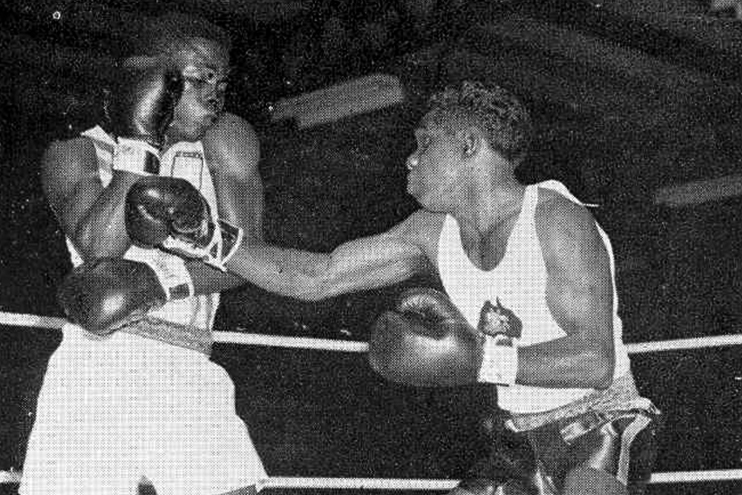
Jeff Dynevor boxing at the Perth 1962 Games. (CGA Archive)
In complete contrast up in Queensland, promising 24-year-old bantamweight Jeff ‘Mitta’ Dynevor and his two mates from the that Cherbourg Settlement, 250km north-west of Brisbane, were also shaping up for a crack at Games glory in their first-ever Australian team.
Boxing expert and historian Grantlee Keiza wrote of an extraordinary feat, that saw the three Cherbourg boys — Dynevor, Adrian Blair and Eddie Barney box their way onto that 10-man boxing team with team captain Madigan at the helm.
‘Mitta’ Dynevor was born in Thargomindah in far western Queensland.
His father was a stockman there before the family was forcibly removed to Cherbourg.
He took up boxing and won the Australian flyweight title in 1957 and 1958, wrote Keiza.
“Barney, who was the Australian flyweight champion before the rise of the great Lionel Rose, was the famous Aboriginal cricketer Eddie Gilbert’s son and he was inspired to success by the stories of his father skittling the wicket of the great Don Bradman in 1931 at the Gabba.
“In 1961 Dynevor was working at the Cherbourg joinery making window frames when he tore apart the top of the index finger of his left hand.
“Rather than waste time with an operation, he explained a simple solution… ‘I just picked up the scissors and cut it off.’
“Dynevor, softly spoken and shy away from boxing, was fast and clever with a devastating left rip to the body.”
He would take the Games gold medal by beating Ghana’s Samuel Abbey in the final of the bantamweight division.
“At the old Cherbourg community hall, they stopped the picture show to announce that the local hero had won gold,” said Kieza.
“The place erupted with clapping, and whistling.”
“It was a time when the success of Indigenous Australians was not celebrated in the wider community but five decades later Eddie Barney recalled that special gold medal moment.
“I was there, in Perth, with him, when he won the gold medal and, oh, my heart went bang,” said Barney.
‘Mitta’ Dynevor joined Percy Hobson who won the high jump as the first Aboriginal athletes to win a Commonwealth gold medal and remains the only Aboriginal person ever to win a gold medal in boxing.
He suffered a stroke in 1969 leaving that powerful left hand of his paralysed, passing away in 2008 and honoured in the Queensland Boxing Hall of Fame.
Remembered as a man who had great respect for his community, his people and his country.
Both Tony Madigan and ‘Mitta’ Dynevor wrote their own pages into the folklore of Australian sport and were Greater Together at the Perth 1962 Empire and Commonwealth Games.
